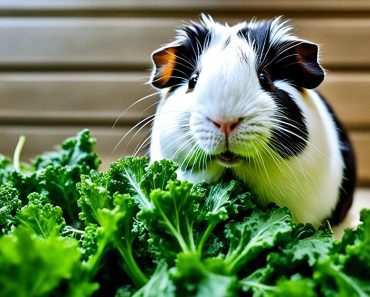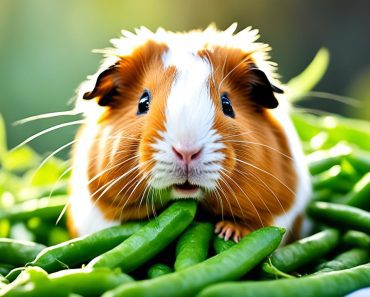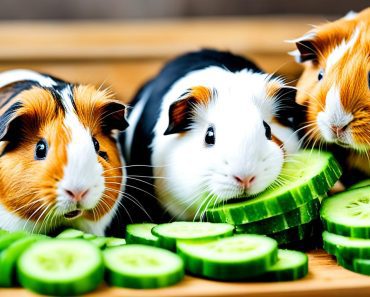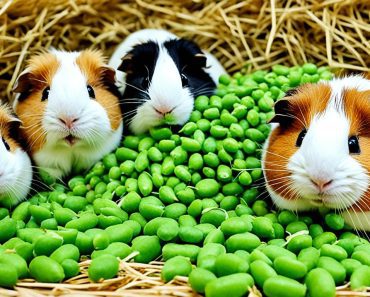I’m excited to share with you all the information you need to know about feeding raspberries to your guinea pig. As a guinea pig owner myself, I understand the importance of providing a safe and balanced diet for these adorable little pets. One common question that often arises is: can guinea pigs eat raspberries?
Guinea pigs can indeed eat raspberries, and they can be a great addition to their diet. Raspberries are packed with essential vitamins and nutrients that can contribute to your guinea pig’s overall well-being. However, it’s important to offer raspberries in moderation and as part of a balanced diet.
To ensure the safety of your furry friend, it’s crucial to wash the raspberries thoroughly before feeding them. This will help remove any pesticides or contaminants that may be present on the fruit. Remember, keeping your guinea pig’s diet as clean and natural as possible is essential for their health.
In the following sections, we will dive deeper into the nutritional value of raspberries for guinea pigs, the potential risks and considerations, how to incorporate raspberries into your guinea pig’s diet, and the importance of monitoring your guinea pig’s health. So let’s explore the world of raspberries and guinea pigs together!
Can Guinea Pigs Eat Raspberries? Yes, but should only be given occasionally.
- Guinea pigs can eat raspberries, but they should be offered in moderation.
- Raspberries are a good source of essential vitamins like vitamin C and minerals.
- Wash raspberries thoroughly before feeding them to your guinea pig to remove any pesticides or contaminants.
- Monitor your guinea pig for any signs of digestive upset or allergies when introducing raspberries to their diet.
- Consult a veterinarian if you notice any behavioral changes or adverse reactions after feeding raspberries to your guinea pig.
Nutritional Value of Raspberries for Guinea Pigs
Raspberries are a delicious and nutritious fruit that can be a great addition to your guinea pig’s diet. They provide essential vitamins and minerals, making them a healthy treat for your furry friend. Let’s take a closer look at the nutritional value of raspberries for guinea pigs.
Vitamins and Minerals
Raspberries are bursting with nutritional goodness, including:
- Vitamin C: Raspberries are loaded with vitamin C, which is essential for guinea pigs. Unlike humans, guinea pigs cannot produce their own vitamin C and need to get it from their diet. Vitamin C helps support their immune system and overall health.
- Manganese: This mineral is important for bone health and plays a role in metabolism and antioxidant function. Raspberries are a good source of manganese, ensuring your guinea pig gets the nutrients they need.
Dietary Fiber
In addition to vitamins and minerals, raspberries are also rich in dietary fiber. Fiber is essential for guinea pigs’ digestive health and helps regulate their bowel movements. It aids in preventing digestive problems and maintaining a healthy gut.
The Importance of Vitamin C
Vitamin C is especially crucial for guinea pigs as they are unable to synthesize it in their bodies. A deficiency in vitamin C can lead to serious health issues, including scurvy. Incorporating foods like raspberries into their diet ensures they receive an adequate amount of this essential vitamin.
To illustrate the nutritional value of raspberries, here’s a comparison between the vitamin C content of raspberries and other common fruits in a table:
| Fruit | Vitamin C Content (per 100g) |
|---|---|
| Raspberries | 26.2mg |
| Strawberries | 58.8mg |
| Oranges | 53.2mg |
| Kiwis | 92.7mg |
Important Considerations
While raspberries offer numerous nutritional benefits, it’s essential to feed them to your guinea pigs in moderation. Their sugar content can contribute to obesity and gastrointestinal issues if consumed excessively. Always introduce raspberries gradually and monitor your guinea pig for any signs of digestive upset or allergies.
In the next section, we will explore the potential risks and considerations when feeding raspberries to guinea pigs, ensuring you provide your furry friend with a balanced and safe diet.
Risks and Considerations of Feeding Raspberries to Guinea Pigs
While raspberries offer various health benefits to guinea pigs, it is important to approach their consumption with caution to ensure the well-being of your furry friend.
Firstly, raspberries should be fed to guinea pigs in moderation due to their sugar content. Excessive sugar consumption can lead to obesity and gastrointestinal issues in guinea pigs, adversely affecting their overall health.
Secondly, raspberries contain oxalates, which are naturally occurring compounds that can contribute to the formation of bladder stones in susceptible guinea pigs. It is essential to be mindful of this potential risk and take appropriate measures to prevent any complications.
“As a responsible guinea pig owner, it is crucial to prioritize their health and well-being by making informed choices about their diet.”
By understanding and addressing these risks, you can enjoy the nutritional benefits of raspberries while minimizing potential harm to your guinea pig. Now, let’s take a closer look at how to incorporate raspberries into your pet’s diet safely and responsibly.
| Benefits | Risks |
|---|---|
| – High in vitamin C, essential for guinea pigs – Rich in dietary fiber, supporting digestive health | – Excessive sugar content can lead to obesity and gastrointestinal issues – Oxalates may contribute to bladder stone formation |
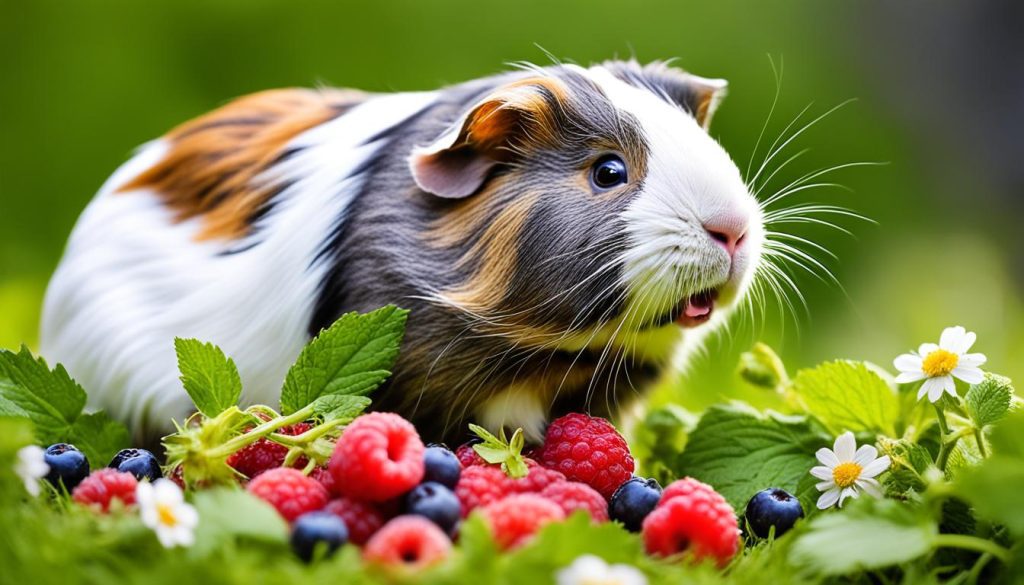
Feeding Guidelines:
- Offer raspberries once or twice a week.
- Introduce them gradually to prevent digestive upset.
- Ensure raspberries are washed, cut, and served in a safe manner to prevent choking.
Remember, observing your guinea pig’s health and behavior is crucial when introducing any new food. If you notice any adverse reactions or discomfort, consult a veterinarian to ensure the well-being of your furry companion.
Incorporating Raspberries into Your Guinea Pig’s Diet
When it comes to incorporating raspberries into your guinea pig’s diet, there are a few important considerations to keep in mind. While raspberries can be a tasty and nutritious treat for your furry friend, they should be offered in moderation and as part of a balanced guinea pig food list.
To start, it’s recommended to offer raspberries to your guinea pig once or twice a week. This ensures they receive the benefits of the fruit without consuming too much sugar. Just like with any new food, it’s important to introduce raspberries gradually into their diet. This allows their digestive system to adjust and minimizes the risk of digestive upset or allergies.
“Introduce raspberries gradually into your guinea pig’s diet to minimize the risk of digestive upset or allergies.”
When offering raspberries to your guinea pig, it’s essential to wash them thoroughly to remove any pesticides or contaminants. Cut the berries into small, bite-sized pieces to prevent choking hazards. Always serve raspberries fresh and avoid feeding them if they have become overripe or spoiled.”
Feeding raspberries to your guinea pig can be a fun and enriching experience for both of you. Just remember to follow these guidelines to ensure your furry friend’s health and well-being.
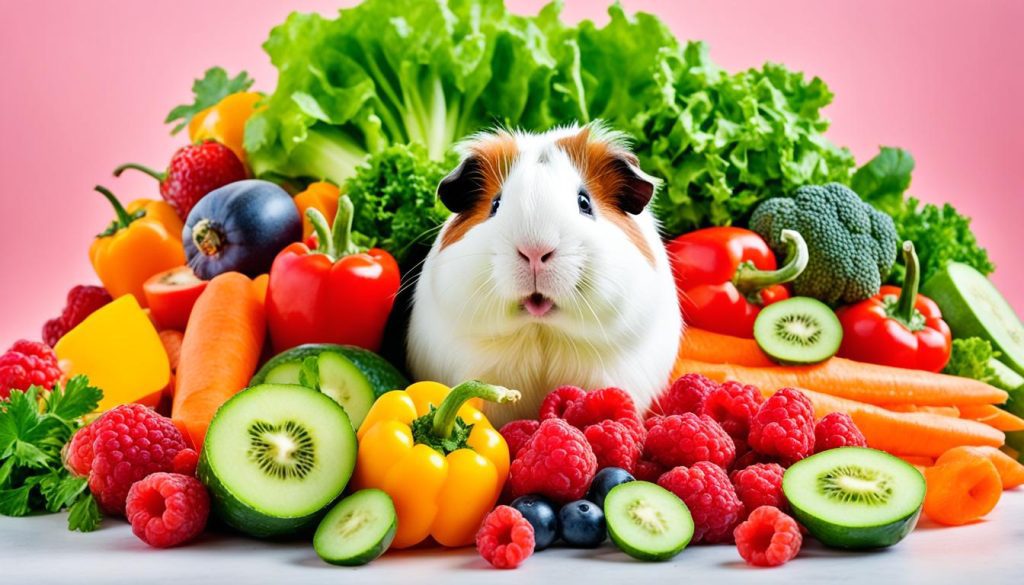
Monitoring Your Guinea Pig’s Health
As a responsible guinea pig owner, it is essential to closely monitor your furry friend’s health and well-being, especially after introducing new foods like raspberries into their diet. Observing for any behavioral changes or adverse reactions is crucial in ensuring your guinea pig’s ongoing care and optimal health.
“Your guinea pig’s health is a top priority. Pay attention to their behavior and any signs of distress.”
If you notice any signs of discomfort, such as decreased appetite, lethargy, or digestive issues, it is recommended to consult a veterinarian promptly. Professional advice is invaluable in addressing any health concerns and providing the necessary guidance to ensure your guinea pig’s swift recovery.
To maintain your guinea pig’s long-term health, regular veterinary check-ups are key. These routine examinations will help detect any underlying health issues and ensure that your furry companion receives the necessary preventive care and vaccinations.
Remember, attentive guinea pig care goes hand in hand with a healthy and happy pet. Keeping a close eye on your guinea pig’s health and seeking professional guidance when needed will contribute to their overall well-being and longevity.
Common Health Issues to Watch for
While guinea pigs are generally hardy animals, there are a few common health issues that can arise. It’s important to be aware of these potential problems and take prompt action if you observe any symptoms. Here are some common health issues to watch for:
- Respiratory infections
- Urinary tract infections
- Gastrointestinal problems
- Dental issues
- Skin problems
If you suspect any of these health issues or notice any other unusual signs, it is crucial to consult a veterinarian right away. Early detection and proper treatment can make a significant difference in your guinea pig’s health and well-being.
| Signs of Good Health | Signs of Potential Health Issues |
|---|---|
|
|
Conclusion
Raspberries can be a tasty addition to your guinea pig’s diet when fed in moderation and as part of a balanced diet. They provide essential vitamins and nutrients that can contribute to your guinea pig’s overall well-being. However, it is crucial to be cautious about the sugar content and potential risks associated with feeding raspberries to guinea pigs.
To safely incorporate raspberries into your guinea pig’s diet, it is important to follow the guidelines. Offer raspberries once or twice a week in small quantities, and introduce them gradually to prevent any digestive upset or allergies. Always wash the berries thoroughly and cut them into appropriate sizes to prevent choking hazards.
While raspberries offer nutritional benefits, it is essential to monitor your guinea pig’s health after introducing them to their diet. If you notice any behavioral changes or adverse reactions, consult a veterinarian for further advice. Regular veterinary check-ups are also important to ensure the overall health and well-being of your guinea pig.
Remember, a guinea pig’s diet should primarily consist of hay, fresh vegetables, and limited amounts of fruit. By incorporating raspberries responsibly and with proper monitoring, you can provide your guinea pig with a varied and nutritious diet that supports their health and happiness. Stay mindful of their safety while offering them this delicious treat!

